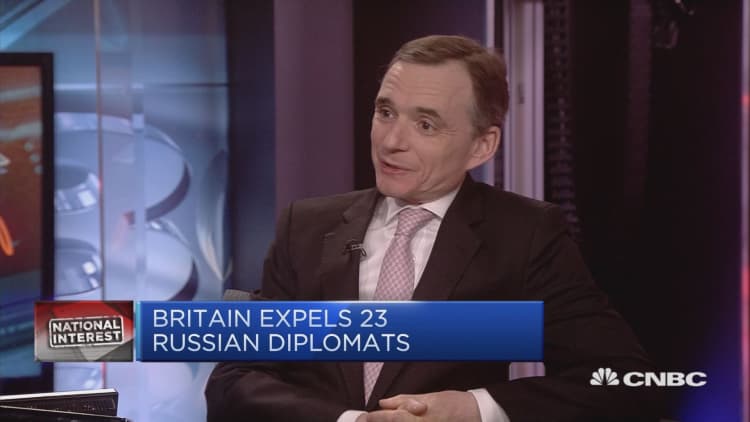
Fears of punitive measures on Russian individuals and their international assets may be scaring Russian capital back to the mother country, one expert told CNBC on Thursday. And this could be good news for the Kremlin.
Recently announced targeted sanctions from the U.S. Treasury Department and threats of asset freezes by the U.K. government are making some wealthy Russians nervous, said Christopher Granville, managing director of global political research at TS Lombard.
"There is evidence of reverse capital flight back from the West into Russia," Granville said, discussing the possible Western retaliatory measures against Russia following its alleged nerve agent attack on a former spy in the English town of Salisbury. British authorities have concluded that the toxin used came from Russia's military, while Moscow has denied the findings.
Granville described "a major book building in a Russian sovereign eurobond" this week with a $7 billion total face value, which he said would be "a very good instrument for Russians who are concerned about the safety of their capital, whether it's held in the U.K. or elsewhere in Western Europe or North America, to repatriate. Plenty of signs of this going on."
$1 trillion exported from Russia
Russian individuals and enterprises have exported a staggering $1 trillion from the country over the past 25 years, according to a report by Macro-Advisory Ltd. That's 60 percent of the current gross domestic product (GDP). So far, little of this has returned for investment.
And Russian money has flooded into Western cities, with many wealthy oligarchs showing a particular interest in London and its real estate sector. Property firm Knight Frank reported a 30 percent rise in Russian applications to buy residential and commercial properties in London from 2016 to 2017.
In 2014, Russians had an estimated $200 billion of financial assets in offshore tax havens.
But if assets and bank accounts are at risk of being frozen, as some officials in the U.K. government are urging, some of that money may start to go right back to where it came from.
The Russian finance ministry in late 2017 claimed high demand for its proposed sovereign eurobonds, the idea of which came from "wealthy Russians facing the prospect of targeted U.S. sanctions" who proposed a "special treasury bond to help them repatriate assets," according to Reuters.
A silver lining for the Kremlin?
The Kremlin has been trying to encourage "deoffshorization" — the repatriation of capital held abroad by Russian businessmen abroad — for some time now, said Daragh McDowell, principal Russia analyst at Verisk Maplecroft.
"From this perspective, the sanctions have had a positive effect. Wealthy Russians have placed their assets in the West largely due to fears of expropriation at home," McDowell said. "If their assets are at risk of being frozen anyway, this no longer holds."
Total capital outflow from Russia in 2017 totaled $31.3 billion, a 160 percent increase from the year before, according to Russia's central bank.
If that kind of money were to be repatriated, it would mean more investment in Russia, but it also "makes it much easier to place individuals and their assets under effective political control," McDowell said. So in effect, a punitive move on Russia could in this way help Russia.
Not so fast, say some analysts — Russia has for years tried to "deoffshore," but it hasn't worked.
"All previous such efforts have failed and the Kremlin has yet to make serious efforts to actualize Putin's December 2017 suggestion to create a special 'oligarch bond,' certainly a fanciful idea," said Max Hess, political risk analyst at AKE Group, referencing the $7 billion Russian sovereign eurobond that Granville cited as a "very good instrument" for capital repatriation.
"The bond hasn't been sold yet… I'm skeptical of mass influx of funds being redomesticated."
The corruption problem
But would the potential homebound cash actually help Russia? That depends on how the money is spent and how much is lost to corruption, said Verisk's McDowell.
"For [President Vladimir] Putin, it is definitely a win, as every oligarch who returns home with their money is one less potential opponent abroad, as well as providing cash that can be used to fund any number of state projects."
Shaky rule of law, insecure property rights and corruption continue to dog the Russian economy, which has recovered from a severe two-year recession but whose growth outlook is "mediocre at best," according to McDowell.
As Russia's weak legal infrastructure is what experts credit with enabling Putin and his allies to wield power, this environment looks unlikely to change in the near-term.


